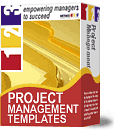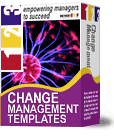Articles on Management Matters:
Problem Solving Success Tip: Use Your Project Management Skills
Solving a big problem is a project: you're far more likely to solve it successfully if you treat it like one. That means you'll need to identify tasks, make and adjust assignments, and keep track of what is due when.
Get on the right track immediately by starting a task list as soon as you start working on the problem. Every time you think of something that needs to be done, put it on your task list along with the owner, due date and completion criteria (how you're going to know the task is successfully completed). That way, you won't have to worry about forgetting important details, or waste time constantly reconstructing the list in your mind.
Once the problem is defined, you can lay out a project schedule and estimate the resources you'll need. At the very least, you'll need access to key people who have knowledge of the problem. Some of them may need to be released from other responsibilities to work on your problem-solving team. You may also need money for travel, special equipment, exclusive use of a conference room, etc. Figuring this out in advance and making sure it is allocated will help you run your project smoothly.
In addition to the tasks to analyze and solve the problem itself, you'll also need a communication plan and a contingency plan. The communication plan will identify who needs what information about your problem solving effort, when they need it and how you are going to provide it. The contingency plan identifies the things that could stop you from solving the problem and specifies what you are going to do about it. Add the appropriate tasks to implement your communication and contingency plans to your task list.
HINT: Orient tasks to deliverables. Each task should result in something tangible, which will help you make sure the tasks actually accomplish something.
copyright 2006. Jeanne Sawyer. All Rights Reserved.
Jeanne Sawyer
23 Nov 2006
Jeanne Sawyer helps her clients solve expensive, chronic problems, such as those that cause operational disruptions and cause customers to take their business elsewhere. Find out about her book, When Stuff Happens: A Practical Guide to Solving Problems Permanently, and get more free information on problem solving at her web site: http://www.sawyerpartnership.com/
Copyright © 2006 - 2007 Tons Of Matters.com. All rights reserved.

Tons of Matters.com
If you matter, then we matter!
7 Horrible Hiring Mistakes
You need to hire the best employees.
You undoubtedly hired some employees who were losers.
Oops! Well, let's be more diplomatic. Let's just say you hired some "underachievers" you would have been better without.
Or maybe you have the curse of hiring only "average" employees - people who are average in productivity and average in producing profits.
Question: Who wants to hire "average" (or "below average") employees?
Answer: No one!
To hire the best, you need to avoid the problems that plagued your previous hiring decisions. So, let me reveal seven horrible hiring blunders or mistakes you may have made.
1st Horrible Mistake: = Interviewers typically do a lousy job at predicting job success. This is a proven fact, verified by a lot of research. Statistically, most interviewers do about as well as flipping a coin!
2nd Horrible Mistake = Reference checks fail to tell you what you really need to know. Most employers are so freaked out about giving reference checks that they tell you nothing or barely anything useful about how an applicant performed on-the-job. Another way to put that is most reference checks are about as non-useful as simultaneously (a) flipping a coin while (b) rubbing a rabbit's foot!!
3rd Horrible Mistake: You relied on your "gut feel" or "intuition" & you were W-R-O-N-G. Later, as you moaned about the mistake you made by hiring the wrong person, you asked yourself, "I knew what I was feeling. But, what was I thinking?"
4th Horrible Mistake: You used subjective prediction methods to make hiring decisions. For example, you relied on subjective interviews, subjective reference checks, or subjective "impressions " of the applicant. Wow! Were you ever off-base. And then you and your company needed to pay for your incorrect hiring decisions. That is expensive, time-consuming, and frustrating.
5th Horrible Mistake: You used NO objective AND customized prediction method. Important: Research shows pre-employment tests are the most objective method to make predictions. But, make sure you use a test customized for specific jobs in your company! If you have not used tests customized for specific jobs in your company, then you really have missed out on the most objective and customized prediction method you could use.
6th Horrible Mistake: You [stupidly] told the applicant what you were looking for!! Then, lo-&-behold, the applicant spent your entire interview telling you s/he just happens to possess all the skills, talents and qualities you - stupidly - told the applicant you want in an employee. For example, let's say you - stupidly - told the applicant you need to hire an employee who excels at teamwork, customer-service, and correctly handling small details. I bet I can predict what that applicant told you in the interview: The applicant told you - with a serious yet pleasant expression - that s/he excels at teamwork, customer-service, and correctly handling small details. And then, when you hired the person who gave you all the answers you - stupidly - told the applicant you want, you pay the price of having an employee who may not REALLY be talented at teamwork, customer-service, or handling small details. You got fooled - and you have only yourself to blame.
7th Horrible Mistake: You terribly harm any person you should not have hired. Let's be humanistic about it. If you hire the wrong person, the applicant also loses. People crave to work in a job where they will do well and enjoy it. People hate a job where they will perform only average or below average, and not enjoy the work. So, you actually benefit the applicant you carefully evaluated using customized, objective hiring methods.
Summary: When you hire . . . 1. high-achieving "superstar" employees, both you and your company win. 2. underachieving employees, (a) you lose and (b) your company loses.
So, make sure you use customized and objective prediction methods, like pre-employment tests, biodata and more, to make sure you hire employees who are (a) productive, (b) profitable, and (c) low turnover.
Copyright 2006
Michael Mercer, Ph.D.
23 Nov 2006
Michael Mercer, Ph.D.,created widely used pre-employment tests - Abilities & Behavior Forecaster™ Tests & also invented the groundbreaking "7-Step Method to Hire the Best™." His 5 books include "Hire the Best -- & Avoid the Rest™". Get his his free 14-page Special Report on "Hiring Productive, Profitable, & Honest Employees", plus a free subscription to his Management Newsletter at www.Pre-EmploymentTests.com

Project Management Kit
The Project Management Kit includes all of the project management templates and project management forms needed to successfully deliver projects.
Every activity in the Project Life Cycle has a detailed project management template to help you succeed. More than 50 Word and Excel project templates are included, comprising over 300 pages of hints and tips, real-life examples, charts and tables.
http://netwkcyj.henrique66.hop.clickbank.net/

Change Management Kit
The Change Management Kit provides the change control templates needed to manage scope, deliverable and resource changes within a project. The Change Request template allows staff to raise a change request within the project. The Change Process can then be followed, to enable the Project Manager to obtain formal change approval. The Change Register allows the team to monitor the effect of the change on the project.
http://netwkcyj.henrique66.hop.clickbank.net/




